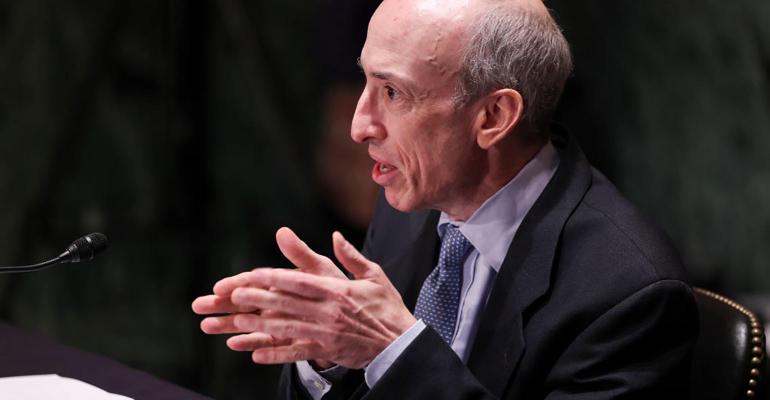Securities and Exchange Commission Chair Gary Gensler affirmed in Senate testimony Tuesday that he wanted the SEC to look into regulatory changes to the practice of payment for order flow, arguing it may not provide “the best competitive landscape” for retail investors.
Gensler’s testimony before the Senate Committee on Banking, Housing, and Urban Affairs covered an array of increasingly hot topics in the new chair’s tenure, including the regulation of crypto assets, the calls for climate risk disclosures from public issuers and the gamification of brokerage apps in attempts to lure investors.
When speaking with Sen. Jack Reed (D-R.I.) about payment for order flow (in which brokerage firms will deal with trading firms to send orders their way in return for rebates), Gensler reiterated the point that there were conflicts inherent to the practice that could result in less efficient markets. He also stressed that it had been 16 years since major revisions were made to the national market structure, and that investors may be missing out on benefiting from best execution even if they are the beneficiary of an improvement in price as a result of payment for order flow.
“If anybody on this committee or staff legally traded in the retail markets, there’s a 97% chance it does not go to a transparent exchange,” Gensler said. “It goes to the dark markets or wholesalers, so it’s harder to get best execution when you’re not competing order to order.”
Whether the SEC would increase its regulatory scrutiny (or push for a ban) on the practice has been top of mind for months in the wake of this year’s GameStop controversy and the practices of platforms like Robinhood, which collects a significant share of its revenue from payment for order flow. Just a suggestion from Gensler that a full ban on the practice was "on the table" caused a dent in Robinhood’s share price last month.
Sen. Thom Tillis (R-N.C.) detailed previous critical statements Gensler had made on payment for order flow, and asked if he still agreed with the criticism. Gensler responded that in a situation where wholesalers can purchase huge amounts of market share in the retail market, he questioned whether orders made to brokers are actually in competition with other orders.
“I think we need to take a look at this whole market structure,” he said.
When discussing cryptocurrencies in his opening testimony, Gensler referred to a “Wild West”–esque atmosphere, comparing it with the period before the passage of federal securities laws. Among other suggestions, Gensler urged the heads of crypto platforms and projects to start a conversation with the commission, noting that some platforms have dozens or even hundreds of tokens.
“While each token’s legal status depends on its own facts and circumstances, the probability is quite remote that, with 50, 100 or 1,000 tokens, any given platform has zero securities,” he said. “Make no mistake; to the extent that there are securities on these trading platforms, under our laws they have to register with the commission unless they qualify for an exemption.”
In other parts of his testimony, Gensler said that a previously announced commission report on the GameStop controversy is “in front of the commissioners” and will be out shortly, and said he believed the commission could use more funding. According to Gensler, the SEC’s workforce decreased by 4% since the end of fiscal year 2016, despite the growth of retail participation in the capital markets.
Several senators also raised what they argued were increased investors’ calls for climate disclosures from companies (a topic also raised in Gensler’s previous congressional testimony). In response to a question from Sen. Tina Smith (D-Minn.), Gensler noted that many companies were making disclosures, just not consistent ones.
“There can be physical risks, as we’ve seen, whether from flooding or weather events, but there can also be transition risk, the transitioning to a new economy as we globally address this,” he said. “But investors are really demanding it, so the role the SEC might have is to bring some consistency and comparability to all of this."





